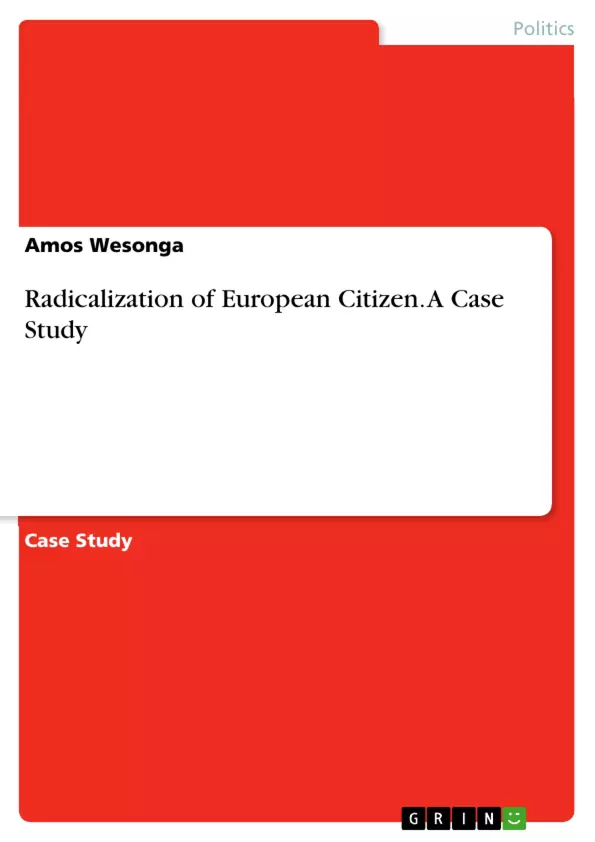Richard Reid is a British citizen, famously remembered for his failed suicide mission. He attempted to bomb an American Airline, which had one hundred and ninety-seven passengers on board. Reid had joined the Islam group and trained for his mission in Al-Qaida.
Despite his failed brutality, the suicide bomber does not regret. For instance, in his letters, he believed that the mission failed because it was not his time to die nor for the passengers on board. Reid stated a second reason for the failed mission as God's plan to let him stay in prison. True to the fact, he does not regret his loss of freedom.
This assignment will use the case study of Reid to explore radicalisation. The analytical tools used in this case are "strains" and "causes"; "frames" and ideology; and socialising and mobilisation.
Inhaltsverzeichnis (Table of Contents)
- Introduction
- Radicalization
- Socialization and Mobilization
- Radicalization in Europe
- Radicalization in the United States
- Conclusion
Zielsetzung und Themenschwerpunkte (Objectives and Key Themes)
This case study explores the radicalization of Richard Reid, the "Shoe Bomber," examining the factors that contributed to his extremist behavior and ultimately led to his failed suicide attempt. It aims to analyze the process of radicalization through various lenses, including "strains" and "causes," "frames" and ideology, and socialisation and mobilization.
- The nature and process of radicalization
- The role of socialisation in shaping extremist ideologies
- The influence of political and religious factors on radicalisation
- The types and motivations of radicals, including passive, active, and violent extremists
- The significance of formal and informal socialisation processes in political participation and extremism
Zusammenfassung der Kapitel (Chapter Summaries)
- Introduction: This chapter provides a brief overview of Richard Reid's case, highlighting his failed suicide mission and his lack of remorse. It introduces the analytical tools used in the study, including "strains" and "causes," "frames" and ideology, and socialisation and mobilisation.
- Radicalization: This chapter defines radicalization as a shift towards extreme views and positions on social or political issues. It explores different forms of radicalization, including political-religious extremism, right-wing extremism, left-wing extremism, and single-issue extremism, providing examples and characteristics of each type.
- Socialization and Mobilization: This chapter focuses on the influence of socialisation processes in shaping individual beliefs and political orientations. It examines formal and informal socialisation agents, such as schools, churches, family, peers, and political events, and their impact on political awakening and mobilisation.
Schlüsselwörter (Keywords)
The key terms and concepts explored in this study include radicalisation, extremism, socialisation, mobilisation, political-religious extremism, right-wing extremism, left-wing extremism, single-issue extremism, passive radicals, active radicals, violent radicals, formal socialisation, informal socialisation, and political awakening.
Frequently Asked Questions
Who was Richard Reid, the "Shoe Bomber"?
Richard Reid is a British citizen who attempted to detonate explosives hidden in his shoes during an American Airlines flight in 2001. He had been radicalized and trained by Al-Qaeda.
What are the main causes of radicalization?
Radicalization is often driven by a combination of social "strains," political ideologies, and personal experiences that lead individuals to adopt extremist views.
What is the difference between active and violent radicals?
Active radicals advocate for extreme changes but may not use force, while violent radicals are willing to commit acts of terrorism or physical harm to achieve their goals.
What role does socialization play in radicalization?
Socialization through peers, extremist groups, or online forums can shape an individual's worldview, providing a sense of identity and purpose through a specific radical ideology.
How does political-religious extremism differ from other types?
Political-religious extremism specifically uses religious doctrine to justify political violence and the pursuit of a society governed by strict religious laws.
- Quote paper
- Amos Wesonga (Author), 2017, Radicalization of European Citizen. A Case Study, Munich, GRIN Verlag, https://www.grin.com/document/429308



